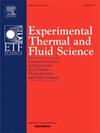Experimental investigation of rotating detonation engine fueled by liquid ethanol and oxygen-enriched air
IF 3.3
2区 工程技术
Q2 ENGINEERING, MECHANICAL
Experimental Thermal and Fluid Science
Pub Date : 2025-04-08
DOI:10.1016/j.expthermflusci.2025.111494
引用次数: 0
Abstract
In this short communication, we explore the feasibility of using renewable ethanol fuel for the rotating detonation engine (RDE) and examine the behavior of the two-phase rotating detonation wave under varying working conditions. The liquid ethanol is injected at ambient temperature, while oxygen-enriched air (60 % oxygen by mass) is supplied at mass flow rates ranging from 90 to 200 g/s. The operation of the RDE is examined under fuel-lean conditions with equivalence ratios ranging from 0.4 to 0.9. At lower mass flow rates, the rotating detonation can still be initiated but remains highly unstable. As the mass flow rate increases, the stability of the ethanol-fueled RDE improves, premature extinction becomes less frequent, and the velocity deficit of the rotating detonation wave decreases.
以液体乙醇和富氧空气为燃料的旋转爆震发动机的实验研究
在这篇简短的通信中,我们探讨了将可再生乙醇燃料用于旋转爆震发动机(RDE)的可行性,并研究了两相旋转爆震波在不同工作条件下的行为。在环境温度下注入液体乙醇,同时以90至200g /s的质量流量供应富氧空气(氧气质量占60%)。在当量比为0.4 ~ 0.9的燃料稀薄条件下,对RDE的运行进行了检查。在较低的质量流量下,旋转爆轰仍然可以启动,但仍然高度不稳定。随着质量流量的增加,乙醇燃料RDE的稳定性提高,早消频率降低,旋转爆震波速度亏缺减小。
本文章由计算机程序翻译,如有差异,请以英文原文为准。
求助全文
约1分钟内获得全文
求助全文
来源期刊

Experimental Thermal and Fluid Science
工程技术-工程:机械
CiteScore
6.70
自引率
3.10%
发文量
159
审稿时长
34 days
期刊介绍:
Experimental Thermal and Fluid Science provides a forum for research emphasizing experimental work that enhances fundamental understanding of heat transfer, thermodynamics, and fluid mechanics. In addition to the principal areas of research, the journal covers research results in related fields, including combined heat and mass transfer, flows with phase transition, micro- and nano-scale systems, multiphase flow, combustion, radiative transfer, porous media, cryogenics, turbulence, and novel experimental techniques.
 求助内容:
求助内容: 应助结果提醒方式:
应助结果提醒方式:


